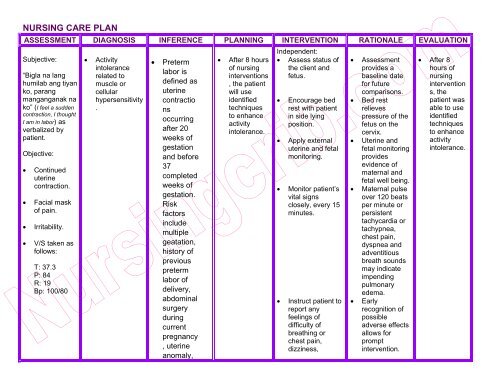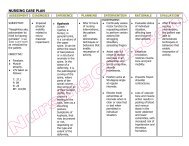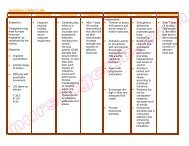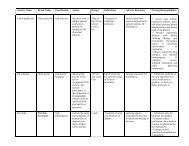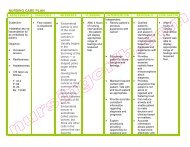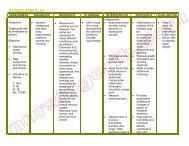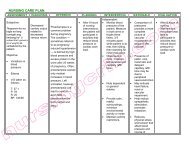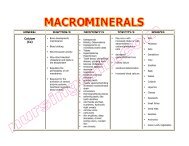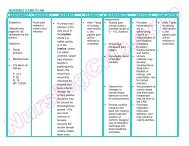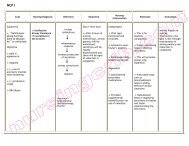NURSING CARE PLAN - Nursing Crib
NURSING CARE PLAN - Nursing Crib
NURSING CARE PLAN - Nursing Crib
Create successful ePaper yourself
Turn your PDF publications into a flip-book with our unique Google optimized e-Paper software.
<strong>NURSING</strong> <strong>CARE</strong> <strong>PLAN</strong><br />
ASSESSMENT DIAGNOSIS INFERENCE <strong>PLAN</strong>NING INTERVENTION RATIONALE EVALUATION<br />
Subjective:<br />
“Bigla na lang<br />
humilab ang tiyan<br />
ko, parang<br />
manganganak na<br />
ko” (I feel a sudden<br />
contraction, I thought<br />
I am in labor) as<br />
verbalized by<br />
patient.<br />
Objective:<br />
<br />
<br />
<br />
<br />
Continued<br />
uterine<br />
contraction.<br />
Facial mask<br />
of pain.<br />
Irritability.<br />
V/S taken as<br />
follows:<br />
T: 37.3<br />
P: 84<br />
R: 19<br />
Bp: 100/80<br />
<br />
Activity<br />
intolerance<br />
related to<br />
muscle or<br />
cellular<br />
hypersensitivity<br />
.<br />
<br />
Preterm<br />
labor is<br />
defined as<br />
uterine<br />
contractio<br />
ns<br />
occurring<br />
after 20<br />
weeks of<br />
gestation<br />
and before<br />
37<br />
completed<br />
weeks of<br />
gestation.<br />
Risk<br />
factors<br />
include<br />
multiple<br />
geatation,<br />
history of<br />
previous<br />
preterm<br />
labor of<br />
delivery,<br />
abdominal<br />
surgery<br />
during<br />
current<br />
pregnancy<br />
, uterine<br />
anomaly,<br />
<br />
After 8 hours<br />
of nursing<br />
interventions<br />
, the patient<br />
will use<br />
identified<br />
techniques<br />
to enhance<br />
activity<br />
intolerance.<br />
Independent:<br />
Assess status of<br />
the client and<br />
fetus.<br />
<br />
<br />
<br />
<br />
Encourage bed<br />
rest with patient<br />
in side lying<br />
position.<br />
Apply external<br />
uterine and fetal<br />
monitoring.<br />
Monitor patient’s<br />
vital signs<br />
closely, every 15<br />
minutes.<br />
Instruct patient to<br />
report any<br />
feelings of<br />
difficulty of<br />
breathing or<br />
chest pain,<br />
dizziness,<br />
<br />
<br />
<br />
<br />
<br />
Assessment<br />
provides a<br />
baseline date<br />
for future<br />
comparisons.<br />
Bed rest<br />
relieves<br />
pressure of the<br />
fetus on the<br />
cervix.<br />
Uterine and<br />
fetal monitoring<br />
provides<br />
evidence of<br />
maternal and<br />
fetal well being.<br />
Maternal pulse<br />
over 120 beats<br />
per minute or<br />
persistent<br />
tachycardia or<br />
tachypnea,<br />
chest pain,<br />
dyspnea and<br />
adventitious<br />
breath sounds<br />
may indicate<br />
impending<br />
pulmonary<br />
edema.<br />
Early<br />
recognition of<br />
possible<br />
adverse effects<br />
allows for<br />
prompt<br />
intervention.<br />
After 8<br />
hours of<br />
nursing<br />
intervention<br />
s, the<br />
patient was<br />
able to use<br />
identified<br />
techniques<br />
to enhance<br />
activity<br />
intolerance.
history of<br />
cone<br />
biopsy,<br />
maternal<br />
age<br />
younger<br />
than 20 or<br />
older than<br />
age 35.<br />
<br />
nervousness and<br />
irregular heart<br />
beats.<br />
Monitor uterine<br />
contractions,<br />
including<br />
frequency and<br />
domain.<br />
<br />
Monitor of<br />
uterine<br />
contractions<br />
provides<br />
evidence of<br />
effective<br />
therapy.<br />
Collaborative:<br />
Obtain diagnostic<br />
studies including<br />
complete blood<br />
count,<br />
hemoglobin and<br />
hematocrit, urine,<br />
vaginal ang<br />
cervical cultures<br />
as ordered.<br />
<br />
Urine, vaginal,<br />
and cervical<br />
cultures help to<br />
rule out<br />
infection as a<br />
causative factor<br />
for preterm<br />
labor.


